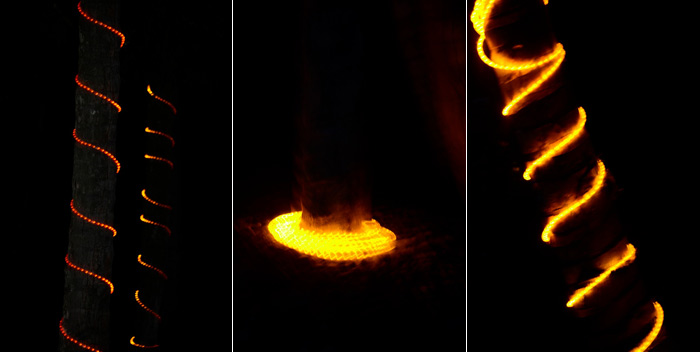not, knot. Or even capitalize, italicize, indent, paginate or “use quotation marks” or
white space
Certain punctuation and formatting conventions barely get our notice, but omit or cancel any of these and we tend to react. It’s useful to know the rules of punctuating as hammered into you in school – useful so that you know the effects of specific marks, what they can do and more importantly, what they can’t do. If you are in control of it, punctuation is an extension of one’s voice – the tone and flavor of the writing.
Punctuation directs the reader where to stop, where to pause, when to breathe – what to couple with what. Perhaps the writer wishes to urge the reader to continue with a breathless pace to mirror the behavior of a character or intentionally disrupt to match discordant subject matter. Punctuation controls rhythm, flow, and cadence. Line breaks and missing punctuation are also cues. As there are no punctuation police, you are free to break any or all of these tired rules to emphasize, amplify, silence, or orchestrate the current of your work.
Junot Diaz does away with quotation marks in his stories. When asked why, he says, “What happens when you get rid of them? I wanted to have parts where you can’t tell if somebody thinks or speaks. That’s the way memory is. I wanted to confuse that.” In Ulysses, James Joyce eliminates all artificial marks to amplify his experimental technique. and the pink and blue and yellow houses and the rosegardens and the jessamine and geraniums and cactuses and Gibraltar as a girl where I was a Flower of the mountain yes when I put the rose in my hair like the Andalusian girls used or shall I wear a red yes and how he kissed me under the Moorish wall and I thought well as well him as another and then I asked him with my eyes to ask again yes and then he asked me would I yes to say yes my mountain flower and first I put my arms around him yes Without interfering punctuation we immerse ourselves in this stream-of-consciousness experience.
But what about dividers? Commas, colons, semi-colons, parentheses, capitals, dashes – these may all be used to separate words, ideas, or phrases for greater coherence or emphasis. Emily Dickinson used the dash with frequency in her poems and capitalized selected words. Early editors decided to “correct” her punctuation and capitalization, thus fiddling with her intended art form.
Here is the original (intended) version of a stanza from poem 632:
The Brain – is wider than the Sky –
For – put them side by side –
The one the other will contain
With ease – and You – beside –
Here is the conventionally “edited” version that has lost its vitality:
The brain is wider than the sky,
For, put them side by side,
The one the other will include
With ease, and you beside.
And then there are the stop signs. The stop signs? The stop signs! The period, the question mark, the exclamation point that bring it to a halt. Cormac McCarthy perfects this fragmented style. They smelled of moss in your hand. Polished and muscular and torsional. On their backs were vermiculate patterns that were maps of the world in its becoming. Maps and mazes. Of a thing which could not be put back. Not be made right again. Caution with these marks though: overuse may cause tedium!
But punctuation permeates our lives in other incarnations than simply marks on a page. At this time of year, I reflect how hours, days, weeks, years, decades, lifetimes, and periods of history are punctuated with celebrations, holidays, time off, time out, skipped beats, missed opportunities, accomplishments, unions and reunions, catastrophic events, and memorable moments. Just as in the writing kind, you can choose your marks – you can punctuate your days, or blend the months, you can dramatize a moment, minimize the years, amplify your voice or contemplate in silence, mark time as if a regimen or decide to ride it out. Where you pause or push ahead, what you think or say or know, what you add and what subtract, mean, glean, infer or demonstrate all comes down to you. So when you consider how to punctuate… or no – as in all matters – stay true!


I felt to free, young again, as the rules of rightness, language, Martha showed me could be coaxed, plied and spurned. That Sister Mary Adelaide could not reach me anymore…in my second seat third row from the left, I was out the door…